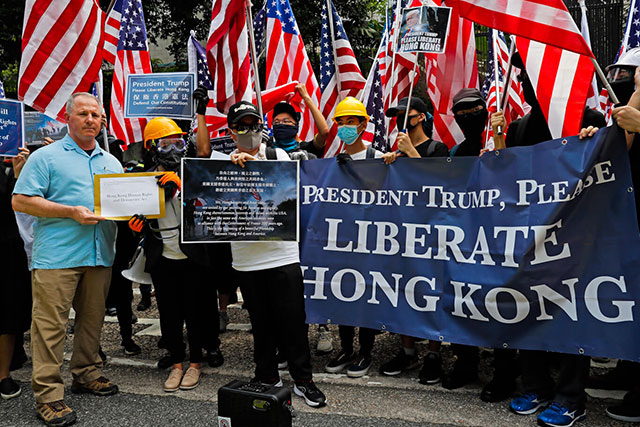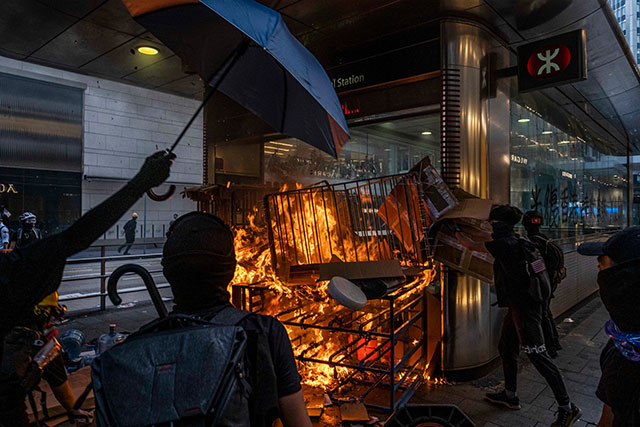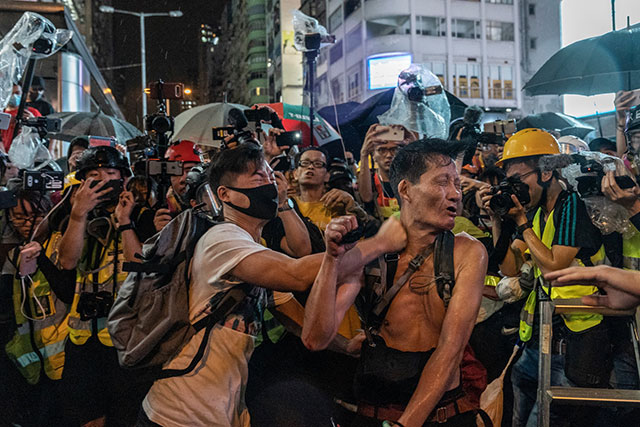
October 2019
Extend the Gains of the 1949 Revolution to Hong Kong – Expropriate the Bourgeoisie, Drive Out the Imperialists
Hong Kong: Defeat Pro-Imperialist Riots With Revolutionary Workers Mobilization

Protest leaders have openly appealed for imperialist aid, as in this march of thousands to the U.S. Consulate, where they were received by an official. (Photo: AP)
“One Country, Two Systems” =
Stalinist Betrayal
For
Genuine Communism Through Workers Political Revolution
OCTOBER 31 – For almost five months, Hong Kong has been convulsed by increasingly violent imperialist-backed protests and riots. Portrayed in the Western media as “pro-democracy,” their ultimate aim is to instigate capitalist counterrevolution in China. Leading spokesmen of the supposedly “leaderless” movement call for independence from China for the former British colony and appeal to the U.S. president Donald Trump to “liberate Hong Kong.” They have traveled to Washington to appeal to the U.S. government, as well as receiving awards and funds from CIA conduits.
It’s not just a few leaders. The protests have been marked by numerous U.S. and UK colonial flags and even the flag of Taiwan, the refuge of the defeated Nationalist army that fled from the Chinese Revolution in 1949. The petty-bourgeois protesters, whether in suits and ties or masked and dressed in black, are virulently anti-communist. They bandy about “Alt-Right” symbols and have embraced fascist provocateurs from the U.S. They were quite literally inspired by the fascist/Ukrainian nationalist uprising of 2014, copied the title of its anthem and adopted its violent tactics.
The current protests are a replay and sharp escalation of the 2014 “Umbrella Movement” in Hong Kong, which was likewise promoted, advised and financed by the imperialists. Yet such counterrevolutionary outbursts and upheavals are the inevitable result of the “one country, two systems” agreement between China and the United Kingdom that led to the 1997 handover of the former imperial outpost that was established by Britain in 1842 as part of the first “Opium War,” when Britain forced the drug trade on the fracturing Qing dynasty that ruled China.
The Hong Kong protests, trumpeted by the imperialist media marching in lockstep, have brought together an anti-communist unholy alliance extending from outright fascists and right-wing conservatives to bourgeois liberals and most of what remains of an ostensibly socialist left. The League for the Fourth International, in contrast, warns that these protests are a threat to the remaining gains of the Chinese Revolution. They must be countered with a working-class mobilization on a revolutionary program to drive out the imperialists, expropriate the Hong Kong bourgeoisie and end Hong Kong’s “autonomous” status as a capitalist enclave.
Imperialist-Instigated Protests
Begun as protests against a bill in the Hong Kong legislature (since withdrawn) that would have allowed extradition of suspects among other places to mainland China, the mass marches and the rioting that has accompanied them have been the severest challenge to Beijing’s control since the territory was returned to China a little more than two decades ago. In a brazen provocation, on July 1, the anniversary of Britain’s handover, protesters stormed the Hong Kong legislative council where they raised the colonial-era flag, yearning for the era when the royal governor appointed almost the entire assembly and executive council.
While some leftist cheerleaders for the Hong Kong protests claimed that such antics were only an aberration, a handful of crazies, the evolution of the protests has dramatically proven them wrong. On August 13, demonstrators stood outside the Hong Kong airport brandishing large American flags and singing the “Star-Spangled Banner.” (Inside the terminal, “pro-democracy” protesters pummeled a reporter for the Chinese Communist Party daily Global Times.) Then on September 8, a “pro-democracy” demonstration of thousands called by the rightist Hong Kong National Party marched to the U.S. consulate in Hong Kong with scores of U.S. flags and a blue banner proclaiming: “President Trump, Please Liberate Hong Kong.”
Two days later, 23-year-old Joshua Wong Chi-fung, one of the leading luminaries of the “anti-extradition” protests as they have exposed themselves as an anti-communist movement, arrived in Germany where he proclaimed that “Hong Kong is like Berlin in [a] ‘new cold war’.” Invited by the right-wing Bild newspaper, Wong declared that the former colony is a bulwark against the “dictatorship of China.” A week later he testified before the U.S. Congress urging support for the “Hong Kong Human Rights and Democracy Act,” to sanction Hong Kong officials and cancel its trade privileges if the U.S. decides it was “undermining basic freedoms.”
Five years ago, Western media imagemakers made Joshua Wong into the face of the U.S.-funded “Umbrella Revolution.” Although that attempt to destabilize China in the interests of Western imperialism eventually petered out, Wong became an international superstar, travelling to Washington where he was lionized by Democratic House leader Nancy Pelosi, named by Fortune magazine the tenth most influential person in the world, nominated for the Nobel Peace Prize by Democratic senator Chris Smith and Republican Marco Rubio, and given an award from Freedom House, funded by the National Endowment for Democracy (NED), which took over CIA funding of “civil society” groups.
As the 70th anniversary of the Chinese Revolution on October 1 approached this year, reactionary forces in Hong Kong and their backers in Washington intensified their sinister provocations. This reached a crescendo as official celebrations in Beijing of the proclamation of the People’s Republic of China were met by an orgy of virulently anti-communist violence in Hong Kong.
 “Anti-extradition” protesters burn
entrance to MTR subway system in Central Hong Kong, September
8.
“Anti-extradition” protesters burn
entrance to MTR subway system in Central Hong Kong, September
8.(Photo: Lam Yik Fei / New York Times)
On the weekend before China’s National Day, protesters turned central Hong Kong’s main commercial areas into a battlefield, hurling bricks and firebombs, burning signs celebrating the PRC’s anniversary. Police responded with clouds of tear gas. Crowds carried signs saying “Anti-ChiNazi” and chanted, “Expel the Communist Party, free Hong Kong.” Bank of China branches were smashed and set ablaze. The slogan “The Heavens will Destroy the Communist Party” was spray-painted on buildings. The September 29 protest was part of “anti-totalitarian rallies” worldwide, including Taiwan, denouncing “Chinese tyranny.”
On October 1, a large crowd marched through a deserted Causeway Bay shopping district chanting, “Hong Kongers, add oil!” and “Reclaim Hong Kong; revolution of our times,” the slogan coined by ultra-rightist “localist” Edward Leung. Flash mobs of black-clad masked thugs roamed the streets, chasing and beating cops, who in several instances drew their revolvers and in one case shot an attacker. In the next days, the squads targeted more than a dozen stations of the MTR subway, smashing glass fronts along with turnstiles and setting entrances ablaze. Many working people expressed outrage over this destruction of their only means of transport.
 "Anti-extradition"
protesters punch man who disagreed with them, October 6. (Photo: Adam Dean for The New
York Times)
"Anti-extradition"
protesters punch man who disagreed with them, October 6. (Photo: Adam Dean for The New
York Times)When Hong Kong’s chief executive, Carrie Lam Cheng Yuet-ngor, ordered a ban on face masks in demonstrations, this set off another round of mass marches and mob riots. A Xiaomi cellphone store was torched, a Fujian restaurant was wrecked and branches of Chinese state-owned banks were trashed. With increasing frequency, attacks were directed at individuals perceived to be from mainland China. A bank employee was punched in the face for speaking Mandarin instead of Cantonese. When he said “we are all Chinese,” attackers yelled “go back to the mainland.” An older shirtless man who argued with demonstrators was beaten bloody.
Defend the Chinese Revolution – End Capitalist Hong Kong’s Special Status
Ever since capitalist rule in the most populous country on the planet was overthrown in 1949 by a peasant army led by the Chinese Communist Party (CCP) under Mao Zedong, the imperialists have been consumed by the ambition to overthrow the “Chicoms.” The anti-communist hysteria of McCarthyism in the U.S. was set off by a witch hunt over “who lost China.” Although it was not the result of a proletarian uprising like the 1917 October Revolution led by Lenin and Trotsky in Russia, and installed a regime modeled on Stalin’s bureaucratically degenerated Soviet Union, the Chinese Revolution represented an enormous historic gain for humankind.
Genuine Trotskyists defended, and continue to defend the Chinese deformed workers state against imperialism and counterrevolution. The gains of the revolution, notably socialized industry and a (bureaucratically) planned economy, have lifted the vast majority of China’s 1.6 billion people out of poverty, a unique achievement. Contrary to the bourgeois economists and most of the left who claim that it had somehow been transformed into a capitalist state, China uniquely didn’t suffer the ravages of the worldwide capitalist crisis and economic depression that began in 2007-09.
Key gains, although under attack, remain and must be defended, tooth and nail. They are undermined by the ruling bureaucracy, which includes many pro-capitalist elements, and by the Stalinist dogma of building “socialism in one country.” Every genuine Marxist from Marx on has insisted that socialism can only be achieved on an international scale, and therefore requires a program for international socialist revolution. The variant of this nationalist program pushed by Beijing leaders from Deng Xiaoping to Xi Jinping, “building socialism with Chinese characteristics,” like Stalin’s is based on the pipedream of achieving “peaceful coexistence” with imperialism.
This was expressed concretely in the case of Hong Kong with the determination of China’s Stalinist leaders to maintain the enclave’s capitalist character. As the Nationalist Kuomintang regime of Chiang Kai-shek collapsed in the late 1940s, Mao ordered the CCP-led People’s Liberation Army (PLA) to stop short of taking Hong Kong. Rather than destroying Chinese capitalism root and branch, he preferred to keep it as an outpost of finance capital, seeking deals with the imperialists. After the victory of the Revolution in 1949, many Chinese capitalists left Shanghai seeking the protection of the British colony.
From the early 1980s under Deng Xiaoping, the negotiations with Britain were premised on the formula “one country, two systems.” By maintaining the capitalist character of the Special Autonomous Regions (SARs) of Hong Kong and the former Portuguese colony of Macau, the Stalinist rulers have sown the seeds for the anti-communist protests that broke out in 2003 and 2014, setting the stage for the situation today. The protests have prominently included lawyers and businessmen whose existence depends on maintaining this status, and investigative journalists have shown that the more militant protest leaders have typically been the entitled offspring of the Hong Kong bourgeoisie, many of them having attended elite private schools.
As we warned 21 years ago:
“The handover of the former British crown colony of Hong Kong to the People’s Republic in July 1997 has incorporated a capitalist enclave whose tentacles have already reached far into China’s interior in the search for cheap labor to exploit.... The annexation of Hong Kong (now a ‘Special Autonomous Region’) will not realize the class-collaobrationist fantasy of ‘one country, two systems,’ as China’s former ‘Paramount Leader’ Deng Xiaping declared. Instead it will give enormous impetus to forces that would restore capitalist rule throughout the country.”
–“Where Is China Going,” The Internationalist No. 6, November-December 1998
Today, the Beijing bureaucracy and its representatives in Hong Kong can only appeal to nationalism, rather than class consciousness, and think in terms of stepped-up repression to answer the counterrevolutionary mobilizations. This is particularly the case as Xi, like his predecessors Mao and Deng, wants to maintain the capitalist character of this banking and shipping hub. The protesters’ tactics, meanwhile, now escalating to use of explosive devices, are clearly intended to provoke intervention by the PLA and Chinese paramlitary police, hoping for a bloody crackdown – a “new Tiananmen” massacre – that could mobilize imperialist intervention.
What’s needed instead is a mobilization of the working people of Hong Kong, many of whom are openly hostile to the “pro-democracy” protesters, these “privileged millenials” who seem bent on destroying workers’ livelihoods. Residents of several neighborhoods, particularly those populated by poor immigrants from the coastal Fujian province, have pelted demonstrators with objects thrown from their public housing towers. They are also incensed at the virulent ethnic hostility against mainland Chinese, who have been depicted as locusts descending on Hong Kong to buy up goods. But there has been no serious effort to mobilize this working-class opposition, only a few tepid nationalist counterprotests waving PRC flags. Rather than relying on military/police units, organized workers should defeat the counterrevolutionary provocateurs in the streets.
Such mobilizations require revolutionary leadership. Yet groups falsely claiming to be Trotskyist have lined up with the counterrevolutionaries. Thus the Hong Kong group named Socialist Action, part of the wing of the Committee for a Workers International (CWI) that split from its founder Peter Taaffe, not only vociferously supports the pro-imperialist demonstrators (claiming that those waving U.S. and UK flags are only “a few misguided Hong Kong youths”), it is calling to extend the counterrevolutionary movent to the rest of China, saying it “can only go forward as a struggle against the real power in Hong Kong, which is the Chinese dictatorship” (Chinaworker.org, 8 September).
Other opportunist leftists such as the misnamed Trotskyist Faction (FT), also support the anti-communist protests, writing: “The socialist left in the U.S. and elsewhere should support the mass struggle in Hong Kong because it is a struggle against repression and state violence” (Left Voice, 22 August). And the followers of the late Ernest Mandel claiming to be the Fourth International openly support demands for Hong Kong independence, headlining an article: “Hong Kong: The millennial generation’s struggle for self-determination” (International Viewpoint, 26 September). All these fakers have a purely (bourgeois) “democratic” rather than a proletarian class program, and thus they end up echoing the imperialists and siding with counterrevolution – as they also did in East Europe and the Soviet Union 30 years ago.
What is required is the forging of a genuinely communist, Trotskyist vanguard to lead the struggle to expropriate the entire Hong Kong bourgeoisie, including its pro-Beijing components, and to join with class-conscious workers and communists throughout China in defending the revolutionary gains. Authentic Trotskyists have always stood for uprooting the heritage of Britain’s colonial theft of Hong Kong, while calling for workers political revolution throughout China to oust the privileged bureaucracy, smash the encroaching capitalists, establish the proletarian democracy of workers councils (soviets), and unite with the world’s workers to open the road to socialism.■
